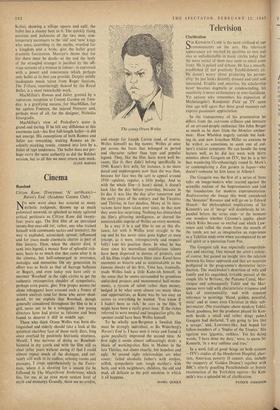Cinema
Rosebud
Citizen Kane. (Everyman; 'A' certificate.)— Raven's End. (Academy Cinema Club.) No new wave since has scoured as many wsthetic rockpools, thrown up as much polemical seaweed, or splashed as many agitated critical petticoats as Citizen Kane did twenty- four years ago. The first film of an untrained twenty-five-year-old (or, rather, one who trained himself with commando tactics and intensity), the way it exploded, astonished, spread, influenced and for years made cinematic chatter is part of film history. Then, when the chatter died, it sank into legend, a mosaic floor of splendid rich- ness, basic to so much else that came after it in the cinema, but half-submerged in reverence, nostalgia and memories: On my generation its effect was as basic as that of barrage balloons or Bogart, and even today you have only to murmur 'Rosebud' in the right circles to get the authentic retrospective shudder of sympathetic, perhaps even poetic, glee. Few proper names (let alone toboggans) have aroused such a frenzy of solemn analysis (and for those who never shud- dered, let me explain that Rosebud, though generally considered throughout the film to be a girl, turns out to be a toboggan): few young directors have had praise as fulsome and been found to deserve it Still in middle age.
Those who think Orson Welles was born dis- tinguished and elderly should take a look at the quizzical choirboy face of those early days, long since overlaid by positively histrionic stoutness. Myself, I was nervous of doing so. Rosebud- haunted in my youth and with the film still so clear (after years without seeing it) that I could almost repeat much of the dialogue, and cer- tainly still walk in its endless, echoing rooms and passages, I crept apprehensively to the Every- man, where it is showing for a season (to be followed by The Magnificent Atnbersons, which lies, for me, at an even more sunken level of myth and memory). Grandly, there are no credits, The young Orson Welles and except for Joseph Cotten (and, of course, Welles himself) no big names; Welles at once put across the faces that belonged to period and character rather than type and popular legend. They, like the film, have worn well be- cause, like it, they didn't belong specifically to 1940. Kane's first wife, for instance, is no more dated and unphotogenic now than she was then, because her face was the sort to appeal around 1910—opulent, regular, a little pudgy. And so with the whole film—it hasn't dated, it doesn't look like the day before yesterday, because in its day it was like the day after tomorrow and the early years of the century and the Twenties and Thirties, in fact dateless. Many of its inno- vations have been taken over since, so that now they seem less surprising. Nothing has diminished the film's glittering intelligence, or slurred the unmistakable imprint of Welles on every moment.
In a way it is a sad film to see at this dis- tance, for with it Welles went straight to the top and he has never since gone higher or even (except, as it were, retrospectively and respect- fully) kept his position there. In what he has done since his marvellous multifarious talents have been dispersed in dozens of projects, and all his films (eight feature films since Kane) have moments as bizarre and as unmistakable as the famous shocks of his first. Time has, ironically, made Welles look a little Kane-ish himself, in the sense that he seems surrounded by grandiose unfinished projects and monumental half-monu- ments, a tycoon of talent rather than money, hedged in by what seem almost too many ideas and opportunities, as Kane was by too easy an access to everything he wanted. 'You know if I hadn't been so rich,' he says in the film, 'I might have been a really great man.' If. the riches referred to were mental and imaginative gifts, the speaker could have been Welles himself.
To be wholly non-Bergman a Swedish film must be strongly individual, as Bo Widerberg's Raven's End is. I have seen it twice and found it quite peculiarly improved the second time. At first sight it seems almost suffocatingly drab: a block of working-class flats in Malmo in the late Thirties, not slums exactly, but hopeless and ugly. At second sight relationships are what count: failed alcoholic father's with restless, selfish, sympathetic son; tough mother's With both, and with neighbours, children, the old and mad, all delicate as the pale sunshine in which it all happens.
ISABEL QUIICILY

































 Previous page
Previous page